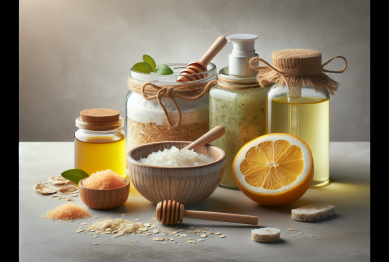As flu season approaches, many people are looking for natural ways to stay healthy and prevent illness. While vaccines and medications are essential, natural immune boosters offer an extra layer of defense. These include specific foods, supplements, and lifestyle changes that help strengthen the body’s immune system.
In this article, we’ll explore top natural immune boosters to help you fight the flu. These tips will support your health and reduce the risk of illness during cold and flu season.

1. Vitamin C: The Immunity Powerhouse
Vitamin C is one of the best-known nutrients for immune health. It helps produce white blood cells, which are crucial for fighting infections. Vitamin C is also a strong antioxidant that protects cells from harmful free radicals.
How to Get More Vitamin C:
- Eat citrus fruits like oranges, lemons, and grapefruits.
- Include bell peppers, kiwi, and strawberries in your diet.
- Consider a supplement, especially if your food intake is low.
Pro Tip: Your body doesn’t store Vitamin C. Eat Vitamin C-rich foods daily to maintain a steady supply.
2. Zinc: The Flu-Fighting Mineral
Zinc is another critical player in maintaining a robust immune system. This essential mineral supports the production and proper function of immune cells, ensuring that the body can efficiently respond to infections. Additionally, studies have shown that taking zinc supplements at the onset of cold or flu symptoms can shorten the duration of illness. By incorporating zinc into your diet or as a supplement, you help bolster your immune defenses, making it easier for your body to ward off infections and recover more quickly from sickness.
2.1 How to Boost Your Zinc Intake:
- Shellfish like oysters and crab are some of the best sources of zinc.
- Meat, chickpeas, pumpkin seeds, and lentils are great alternatives if you’re looking for plant-based sources.
- Consider taking a zinc supplement, particularly during cold and flu season, to give your immune system extra support.
3. Elderberry: Nature’s Antiviral Berry
Elderberry has gained significant popularity as a natural remedy for preventing and treating colds and flu. The berries and flowers are rich in antioxidants and are believed to possess antiviral properties that can help reduce the severity and duration of flu symptoms. Studies suggest that elderberry may be effective in boosting immune responses, helping the body to better fight off infections like the flu. By incorporating elderberry into your regimen, whether through syrups, teas, or supplements, you may provide additional immune support during cold and flu season.
3.1 How to Use Elderberry:
- Elderberry syrups are a popular choice, and they can be found at most health stores.
- Elderberry can also be consumed as a tea or gummy supplement.
- Quick Tip: Start taking elderberry at the first sign of flu symptoms for the best results. It may help reduce the severity and shorten the duration of the illness.
4. Probiotics: Support Your Gut Health
A strong immune system begins in the gut. Probiotics, which are beneficial bacteria found in fermented foods and supplements, play a key role in maintaining a healthy balance within your digestive system. A well-balanced gut supports proper immune function by enhancing the body’s ability to defend against pathogens, thereby reducing the likelihood of catching colds and the flu. By incorporating probiotic-rich foods like yogurt, kefir, and sauerkraut into your diet, or by taking a high-quality probiotic supplement, you can support your immune system and overall health throughout the flu season.
4.1 Best Probiotic Sources:
- Yogurt with live cultures, kefir, and sauerkraut are excellent food sources of probiotics.
- Kombucha, a fermented tea, is another popular option.
- If you prefer, you can take a probiotic supplement to ensure you’re getting enough good bacteria.
- Pro Tip: Aim to consume a variety of fermented foods regularly to ensure you’re getting a diverse range of probiotics to support your gut health and immune system.
5. Garlic: A Natural Immune Booster
Garlic has been used for centuries for its medicinal benefits, and modern research confirms its effectiveness as a natural immune booster. It contains compounds like allicin, which enhance immune function by stimulating immune cells that fight off viruses and bacteria. Additionally, research suggests that garlic can help reduce the severity and duration of colds and flu. By including garlic in your meals or taking it as a supplement, you may strengthen your immune defenses and improve your body’s resilience during cold and flu season.
5.1 How to Incorporate Garlic:
- Add raw or cooked garlic to your meals, such as soups, stir-fries, or roasted vegetables.
- Take a garlic supplement if you’re not getting enough through food.
- Did You Know? Studies suggest that garlic can enhance the function of immune cells and may even reduce the frequency of colds in people who regularly consume it.
6. Turmeric: The Anti-Inflammatory Spice
Turmeric, a spice frequently used in Indian cuisine, contains curcumin, a potent anti-inflammatory compound. Chronic inflammation, which can weaken the immune system, makes the body more susceptible to infections. By incorporating anti-inflammatory foods like turmeric, you can support immune health and help reduce the negative impact of inflammation on your body’s defenses. Additionally, curcumin has been shown to boost immune responses by modulating various immune cells and reducing oxidative stress. Including turmeric in your diet, whether through meals or supplements, can enhance your overall immune function.
6.1 How to Use Turmeric:
- Add turmeric to soups, stews, and smoothies.
- Take a turmeric supplement to ensure you’re getting a concentrated dose of curcumin.
- Quick Tip: Combine turmeric with black pepper to increase the absorption of curcumin, making it more effective in supporting immune health.
7. Green Tea: Rich in Antioxidants
Green tea is packed with antioxidants called catechins, which can enhance immune function. Drinking green tea regularly may help reduce your risk of catching the flu or other viral infections.
7.1 How to Incorporate Green Tea:
- Drink 1-3 cups of green tea daily to reap its immune-boosting benefits.
- Try matcha, a concentrated form of green tea, for an even higher dose of antioxidants.
8. Stay Active and Get Enough Sleep
While nutrition plays a crucial role in immune health, don’t forget about other lifestyle factors like exercise and sleep. Regular moderate exercise can boost your immune system, while sleep allows your body to rest and recover, improving your resistance to infections.
8.1 Immune-Boosting Lifestyle Tips:
- Aim for 30 minutes of moderate exercise most days of the week.
- Prioritize 7-8 hours of quality sleep each night to help your body recharge and fight off illness.
9. Green Tea: Packed with Antioxidants
Green tea is another powerful natural immune booster that helps fight infections and protect cells from damage. In fact, studies show these antioxidants enhance immune function by supporting the body’s defense against the flu. By drinking green tea regularly, you can boost your overall health and provide your immune system with the extra support it needs. Incorporating 1-3 cups of green tea into your daily routine is an easy and effective way to enhance your natural immune response.
10. Regular Exercise: A Key to Immune Health
Additionally, regular exercise plays a crucial role in maintaining a healthy immune system. Moderate exercise improves circulation, allowing immune cells to move more freely through the body, which helps detect and fight infections faster. Simple activities like walking, jogging, or yoga can strengthen your immune system over time. However, it’s important to avoid over-exercising, as intense workouts may temporarily suppress immune function. By maintaining a balanced exercise routine, you ensure your body stays healthy and ready to fight off illness during flu season.
11. Stay Hydrated for Immune Support
Staying hydrated is crucial for maintaining a strong immune system, especially during flu season. Water helps transport nutrients to your cells, flush out toxins, and keep your body functioning optimally. Moreover, dehydration can weaken the immune system, making it more difficult for your body to fight off infections. In addition, drinking herbal teas, broths, and soups can provide both hydration and essential nutrients. By ensuring you drink enough water each day—around 8 glasses or more—you support your body’s ability to stay healthy and naturally fend off colds and flu.
12. Reduce Stress to Strengthen Immunity
Managing stress is also another important factor in maintaining a strong immune system. Chronic stress can lead to elevated cortisol levels, which in turn can suppress the immune response and make you even more susceptible to infections like the flu. In fact, research shows that stress weakens your body’s ability to fight off viruses and bacteria. Additionally, to protect your immune system, practice stress-reducing techniques such as meditation, deep breathing, or yoga. By incorporating these practices into your daily routine, you help lower stress levels and give your immune system the boost it needs to keep you healthy during flu season.
Conclusion: Boost Your Immunity Naturally
With flu season around the corner, it’s crucial to give your immune system the support it needs in order to keep you healthy. Immune boosters fight flu by strengthening your body’s natural defenses against illness. By incorporating these natural immune boosters—from Vitamin C as well as zinc to elderberry and probiotics—you can effectively fortify your immune system and reduce your risk of illness. Furthermore, when you combine these nutrients with a healthy lifestyle, you’ll be well-prepared to fight off the flu naturally.
References:
1. Mayo Clinic Health System – “Fight off the flu with immune-boosting nutrients”.
2. Life Extension – “Fight Back Against Colds and Flu”.
3. Observer – “5 All-Natural Flu Remedies That Actually Work”.









